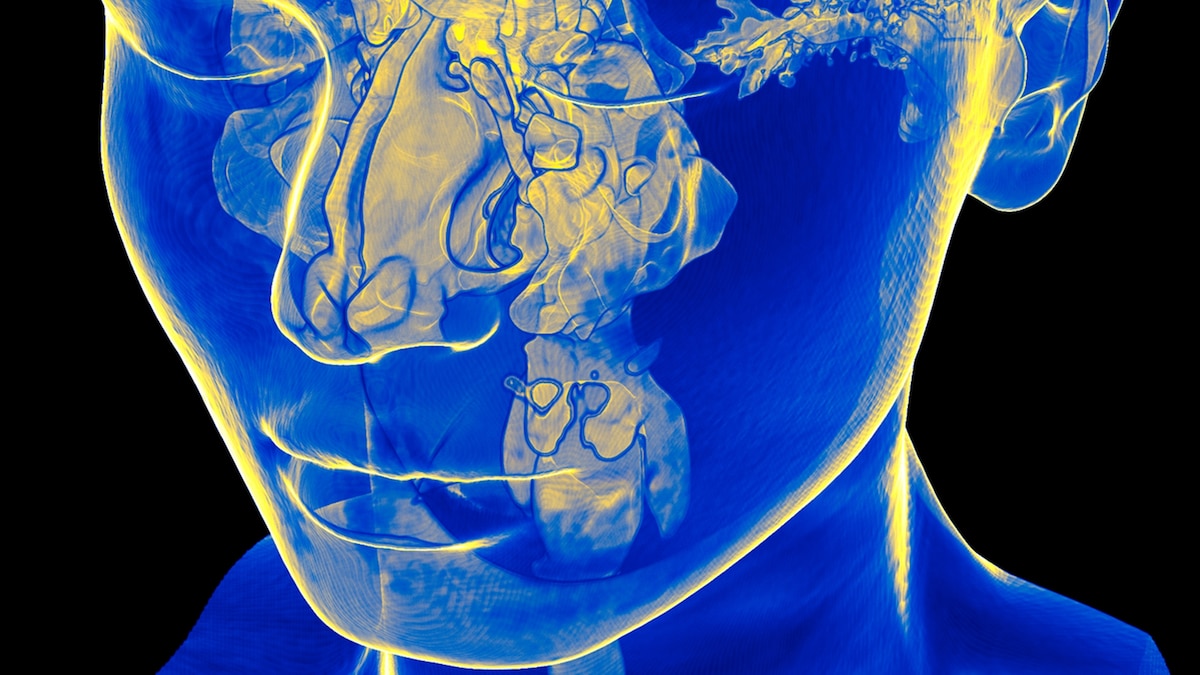Now Reading: Your breathing pattern is unique like your fingerprint—and may help predict health issues
-
01
Your breathing pattern is unique like your fingerprint—and may help predict health issues
Your breathing pattern is unique like your fingerprint—and may help predict health issues

Everyone’s breathing pattern is unique, and soon scientists might be able to analyze yours to diagnose what ails you.
Scientists were able to identify individual people based just on their breathing pattern with 96.8 percent accuracy, and different patterns corresponded to differences in physical and mental traits, according to a new study in Current Biology.
Because it happens subconsciously, breathing may seem simple, but it’s controlled by a complex brain network.
“Respiration has to be coordinated with almost everything,” says Noam Sobel, neurobiologist at the Weizmann Institute of Science in Israel and co-author of the new study. From timing our breathing when we speak, to when we swim, the respiratory system is often negotiating with various parts of the brain.
“Although breathing starts with this breathing center in the brain stem, it actually ends up being coordinated with a humongous chunk of your brain,” says Sobel. Those different parts of the brain include regions responsible for language, emotion, and motor skills.
Inhaling drives specific waves in the brain’s memory center that help consolidate memories. When we inhale, pressure in the nasal cavity changes, which excites neurons that send signals to the brain, according to Detlef Heck, a University of Minnesota neuroscientist who was not involved with the new research.
The moment of transition from breathing out to breathing in might have a sort of reset effect in the brain, so changing the breath can help stress regulation and cognitive performance. Slow breathing techniques are used to reduce stress and anxiety, alter mood, and changing breathing patterns can affect cognitive ability and focus.
Scientists are still learning about how the brain shapes breath, how breath shapes the brain, and what information this could one day tell doctors about a patient’s health.
Unique breath “fingerprints”
The team conducting the new research mostly studies the brain-breath connection in olfaction, or how taking in scents through the nose brings information directly to the brain to process.
Since every brain is unique, the study authors hypothesized that the respiratory patterns shaped by those brains would also be unique.
To test their hypothesis, the team developed a lightweight, wearable tube that fit inside the participant’s nose and continuously tracked nasal airflow over 24 hours. A hundred healthy young adults wore the nasal tube device while going about their daily lives, and logged their activities in a cell phone app.
Study participants all had remarkably distinct breathing patterns, according to the results. The research team was able to identify individuals from only their breathing patterns with 96.8 percent accuracy using a machine learning analysis. This level of accuracy was consistent across multiple retests over two years, meaning the test’s precision rivals that of some voice recognition technologies.
You May Also Like
“It’s very rare that you can predict a biological process so accurately,” says Sobel.
Each respiratory “fingerprint” also provided insights into each person’s mental and physical condition, since certain breathing patterns correlated with body mass index, sleep-wake cycle, and depression and anxiety. Participants who had higher anxiety levels based on questionnaire responses, for example, tended to have shorter inhales and more varied pauses between breaths while sleeping.
Pauses between breaths turned out to be an especially meaningful parameter: one person might consistently pause for one second after each breath, while another person might sometimes pause for one second and other times pause for five seconds. This variability statistic was a powerful tool in the predictive models, says Sobel.
Why the nose controls the brain
Nasal airflow is so closely connected to the brain because of the evolution of the sense of smell, scientists theorize.
Nasal breathing has also been linked to how we form mental images, for example, and smell is associated with how we store memories.
That may be because smell is the oldest sensory system to exist in mammals, says Sobel, and it’s considered a sort of evolutionary scaffolding organizing the evolution of the structure of the mammalian brain.
Although modern humans are more visually-oriented, connections between nasal breathing and so many parts of the brain could be a mechanism left over from evolution, explains Daniel Kluger, neuroscientist at the University of Münster in Germany, who was not involved with the new research.
In studies on performance in visual and spatial tasks—having nothing to do with smell—people tend to perform better while inhaling than while exhaling. This could be because inhalation makes us more sensitive toward any sensory inputs, not only smell, says Kluger, so we’re more likely to perceive visual, auditory, and tactile information when it’s presented while we’re breathing in.
“You’re in a particular bodily state [while inhaling] that makes you more sensitive to incoming sensory stimuli,” explains Kluger.
Change your breath to change your brain?
Measuring the link between breathing patterns and health conditions on more people could help develop breath analysis as a diagnostic tool, say scientists.
“This is a super exciting finding, but someone needs to show it also works for other [groups],” says Heck, “but in general I think this is a very promising direction.”
The study authors are now testing their device and analysis method to screen for diseases.
The findings also raise questions about whether changing breath patterns could change what’s going on in the brain.
“There’s a chicken and egg question here, of what drove what: are you breathing this way because you’re depressed, or are you depressed because you breathe this way?” asks Sobel. “If it’s the latter, then that’s potentially exciting because that opens paths to intervention—so, can I teach you to breathe in a way that will make you less depressed or less anxious?”























